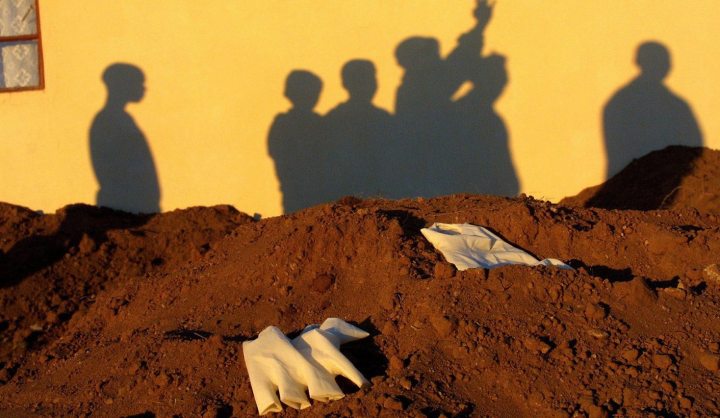South Africa
Crime statistics: Crucial, but flawed

While most MPs are doing constituency work this week, Police Minister Nathi Nhleko will brief the portfolio committee on police today on the annual crime statistics. Politically they're crucial, but their relevancy has been questioned. By GREG NICOLSON.
There were notable improvements in the 2013/14 crime statistics. Total reported sexual offences were down, as was commercial crime, stock theft, arson and malicious damage to property. Yet violent crime increases stole the headlines. Reported murders increased by 3.5% per 100,000 people, attempted murder by 3.2%, and robbery with aggravated circumstances by 11.2%.
“Murder rate up again,” reported eNCA.
With local elections looming next year, it’s important for the African National Congress (ANC) to end the recent trend of increasing levels of violent crime. The party’s 2014 election manifesto committed to reducing crime, “specifically contact crimes like murder, rape and grievous bodily harm”. Ministers have proudly listed the thousands of arrests under Operation Fiela-Reclaim. In response to more than 60 police officers being killed in 2015, the president has noted that “crime in South Africa is violent” and has urged cops to fight back – within the law.
It would be a political boon for the ANC if there’s a reduction in violent crime this year, but that looks unlikely. Nhleko will brief Parliament’s portfolio committee on police today, the first time since 1994 that the annual crime statistics will go straight to Parliament rather than being presented at a media briefing. Committee chairman Francois Beukman has called it a win for oversight, with MPs able to interrogate the figures immediately. South African Police Service (SAPS) leaders have faced criticism from the committee in recent months and Nhleko will need to defend the accuracy of the statistics and provide direction on how to improve them.
He will release the statistics with SAPS National Commissioner Riah Phiyega. While President Jacob Zuma has launched an inquiry into Phiyega’s fitness to hold office, based on recommendations in the Marikana commission of inquiry’s report, Zuma is considering her response on why she shouldn’t be suspended in the interim.
It’s likely that reported levels of violent crime will again have increased. Beeld has reported that statistics on murder, rape, hijackings and house robberies in Gauteng saw sharp increases between April 2014 and January this year. It’s unclear how accurate the figures are. In a briefing last week on crime trends, Frans Cronje from the Institute of Race Relations predicted an increase in violent crime. “I think it is a disaster. This is what we anticipate,” he said, noting the significant fall in murders over 20 years but the spike in violent crimes in recent years.
Gareth Newham from the Institute of Security Studies is one of the go-to sources on crime statistics and has repeatedly noted the increase in crime, and particularly the violence associated with robbery. “This is not a spike. We are three years into a fundamental surge in crime. It’s fundamentally changing the nature of crime in South Africa and driving up the murder rate. This is not a spike. This is something that is deathly serious,” he said in August.
Newham has questioned the relevance of the statistics and has called for more frequent releases. Annual crime statistics follow the financial calendar, from April to March. That makes them out of date and denies those outside of the SAPS, policing experts in academia or civil society, crucial data they could use to offer solutions to the broad and complex problems to combatting crime. The information is readily available, Newham has written, but the police hold on to it while at the same time complaining that they can’t reduce crime alone.
The Democratic Alliance’s (DA’s) Dianne Kohler Barnard has called for real-time crime statistics to be publicly available and for quarterly reports to Parliament. She also wants the statistics to be independently audited. Two years ago the stats featured old population figures, causing inaccurate crime ratios. In her notes before speaking at a press conference today, Kohler Barnard also said the figures should not be used as performance measures for cops and that police must establish specialised units based on the findings to combat gangs and drugs.
“National government and the SAPS are failing in the fight against crime. But we do not need to accept crime as an inescapable reality in South Africa,” she said. The DA-led City of Cape Town is waiting for the crime statistics for a possible move to declare areas of the city disaster zones to push the national government to allocate more policing resources to combat crime.
Nhleko recently told Parliament of his broad plans to overhaul the police in response to the Marikana report. In his budget vote speech this year, which referenced the Freedom Charter, Socrates and Plato, he emphasised visible policing, the calls for specialised units and the White Paper on Safety and Security drafted in response to modern policing challenges.
When Phiyega was criticised in the media recently, provincial SAPS commissioners noted the recent improvements in policing. They referred to high-profile operations, the vetting of senior management, amendments to standing orders, attempts to improve the service at police stations, and efforts to improve Crime Intelligence and detective services. When the parliamentary committee accused them of playing politics, the provincial ministers were forced to apologise for supporting the commissioner.
Whether there has been a real improvement in the fight against crime will be apparent today. Many South Africans already know the effects of crime, but the figures will be crucial in forming perceptions leading up to the elections. DM
Photo by EPA/Thys Dullaart.


















 Become an Insider
Become an Insider